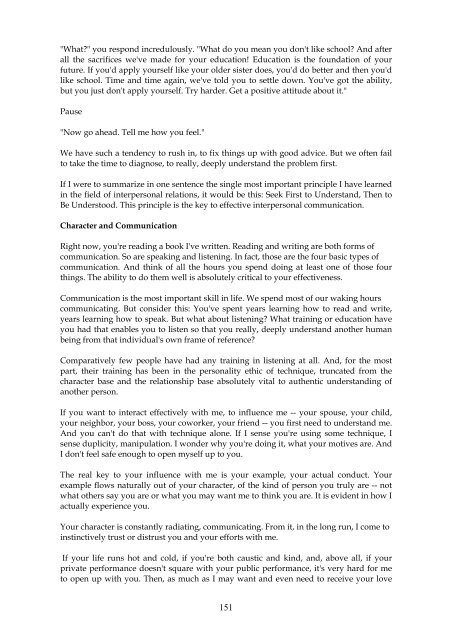Covey - The 7 habits of highly effective people
Create successful ePaper yourself
Turn your PDF publications into a flip-book with our unique Google optimized e-Paper software.
"What?" you respond incredulously. "What do you mean you don't like school? And after<br />
all the sacrifices we've made for your education! Education is the foundation <strong>of</strong> your<br />
future. If you'd apply yourself like your older sister does, you'd do better and then you'd<br />
like school. Time and time again, we've told you to settle down. You've got the ability,<br />
but you just don't apply yourself. Try harder. Get a positive attitude about it."<br />
Pause<br />
"Now go ahead. Tell me how you feel."<br />
We have such a tendency to rush in, to fix things up with good advice. But we <strong>of</strong>ten fail<br />
to take the time to diagnose, to really, deeply understand the problem first.<br />
If I were to summarize in one sentence the single most important principle I have learned<br />
in the field <strong>of</strong> interpersonal relations, it would be this: Seek First to Understand, <strong>The</strong>n to<br />
Be Understood. This principle is the key to <strong>effective</strong> interpersonal communication.<br />
Character and Communication<br />
Right now, you're reading a book I've written. Reading and writing are both forms <strong>of</strong><br />
communication. So are speaking and listening. In fact, those are the four basic types <strong>of</strong><br />
communication. And think <strong>of</strong> all the hours you spend doing at least one <strong>of</strong> those four<br />
things. <strong>The</strong> ability to do them well is absolutely critical to your <strong>effective</strong>ness.<br />
Communication is the most important skill in life. We spend most <strong>of</strong> our waking hours<br />
communicating. But consider this: You've spent years learning how to read and write,<br />
years learning how to speak. But what about listening? What training or education have<br />
you had that enables you to listen so that you really, deeply understand another human<br />
being from that individual's own frame <strong>of</strong> reference?<br />
Comparatively few <strong>people</strong> have had any training in listening at all. And, for the most<br />
part, their training has been in the personality ethic <strong>of</strong> technique, truncated from the<br />
character base and the relationship base absolutely vital to authentic understanding <strong>of</strong><br />
another person.<br />
If you want to interact <strong>effective</strong>ly with me, to influence me -- your spouse, your child,<br />
your neighbor, your boss, your coworker, your friend -- you first need to understand me.<br />
And you can't do that with technique alone. If I sense you're using some technique, I<br />
sense duplicity, manipulation. I wonder why you're doing it, what your motives are. And<br />
I don't feel safe enough to open myself up to you.<br />
<strong>The</strong> real key to your influence with me is your example, your actual conduct. Your<br />
example flows naturally out <strong>of</strong> your character, <strong>of</strong> the kind <strong>of</strong> person you truly are -- not<br />
what others say you are or what you may want me to think you are. It is evident in how I<br />
actually experience you.<br />
Your character is constantly radiating, communicating. From it, in the long run, I come to<br />
instinctively trust or distrust you and your efforts with me.<br />
If your life runs hot and cold, if you're both caustic and kind, and, above all, if your<br />
private performance doesn't square with your public performance, it's very hard for me<br />
to open up with you. <strong>The</strong>n, as much as I may want and even need to receive your love<br />
151


